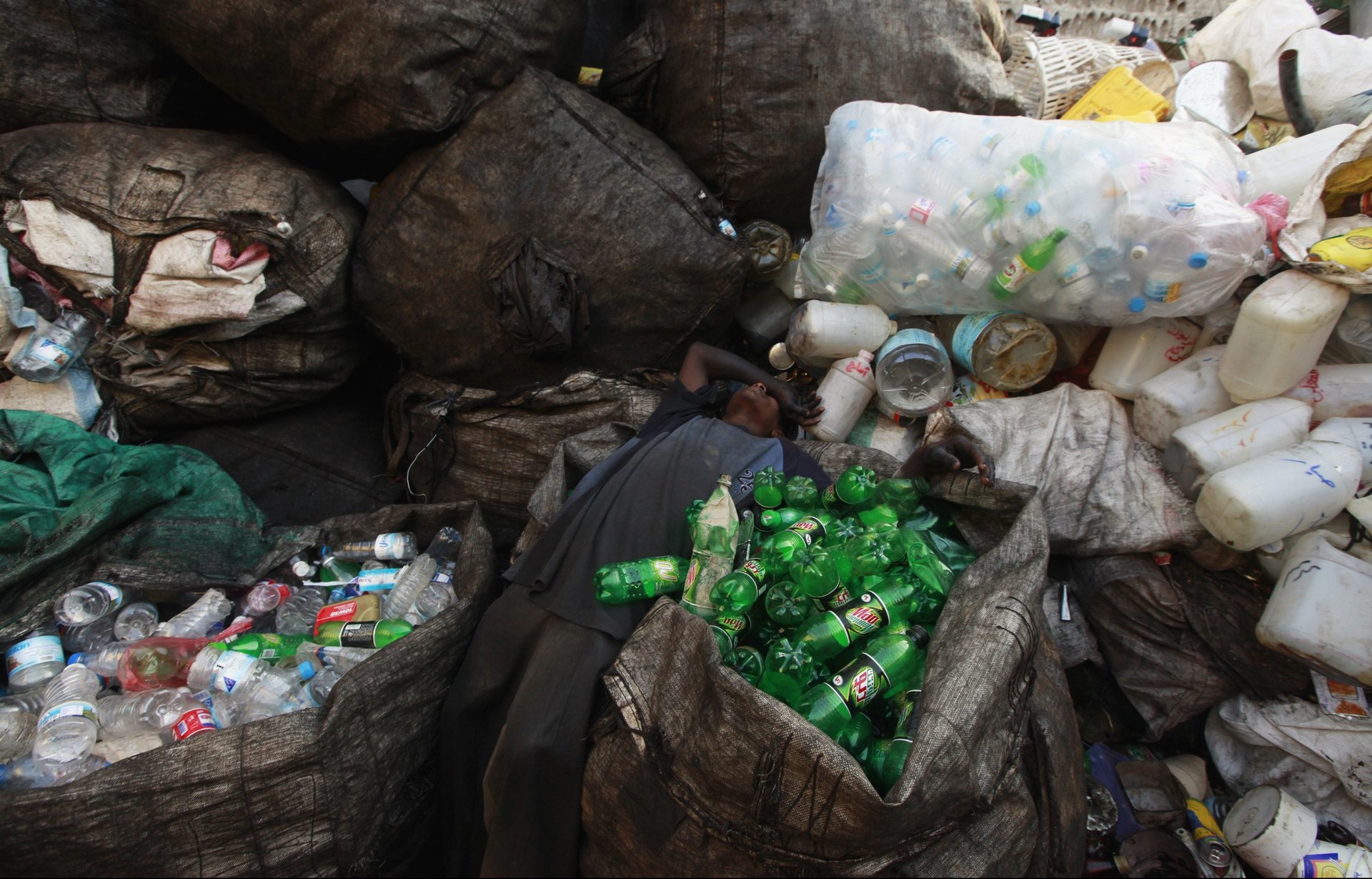India’s plastic waste crisis is too big, even for Modi
India generates nearly 26,000 tonnes of plastic waste every day, making it the 15th biggest plastic polluter globally.


India generates nearly 26,000 tonnes of plastic waste every day, making it the 15th biggest plastic polluter globally.
Discarded plastic waste litter the country’s roads, rivers and also form huge mounds in garbage dumps across the country. “The rubbish dump I frequent is filled mostly with plastic,” Ram Kumar, a ragpicker in Noida, near New Delhi, told Quartz. “Bottles, containers, and polythene bags are some of the items I routinely gather from here (to sell to recyclers).”
During the monsoon, plastic bottles at the dump accumulate water and are a breeding ground for mosquitoes. Besides the stench, the site poses a major health hazard for the area’s residents, exposing them to the mosquito-borne diseases.
Many a times, the solid waste has been put on fire by the municipal agency, polluting the air. It can also be fatal for the stray animals, mainly cows and dogs that end up mistaking plastic for food.
Taking cognisance of the crisis, prime minister Narendra Modi himself has urged for a nationwide movement to end the scourge. He wants Indians to shun single-use plastic from Oct. 02 this year, the 150th birth anniversary of Mahatma Gandhi. He first made the appeal during his Independence Day speech, reiterating his message in his weekly radio programme, Mann Ki Baat, 10 days later on Aug. 25.
Authorities are already in action mode.
While the Lok Sabha secretariat has prohibited the use of non-reusable plastic water bottles and other plastic items within the Parliament from Aug. 20, the government-run railways is also set to ban single-use plastic at all its stations and on trains. “All vendors and staff across Indian Railways are to be encouraged to use reusable bags to reduce plastic footprint,” a circular said on Aug. 22.
However, these baby steps are unlikely to even begin making a dent, given the gravity of the problem.
Giant scourge
“Plastic accounts for 8% of the total solid waste generated in the country annually, with Delhi producing the biggest quantity, followed by Kolkata and Ahmedabad,” said a 2018 report (pdf) by the Delhi-based The Energy and Resources Institute (TERI), citing data from India’s central pollution control board (CPCB).
Of the 25,940 tonnes of plastic waste produced in India everyday according to CPCB, 94% is thermoplastic, or recyclable materials such as PET (polyethylene terephthalate), and PVC (polyvinyl chloride). Yet, these materials can be recycled utmost 7-9 times, after which they have to be disposed off.
That brings us to a key missing aspect: waste management system.
“The plastic waste we generate daily is not recycled or reused and neither is there a foolproof system of disposal,” says Kavita Ashok, president and founder of a Delhi-based NGO Tree for life.
The CPCB, in 2014, estimated that India recycles as much as 80.28% of plastic waste, thanks to an army of rag pickers, who collect and segregate the waste. However, out of the non-recyclable waste, merely 28.4% could be treated before being disposed off, leaving the rest to pollute landfills or rivers, and seas, according to TERI.
Time and again, the centre, and various state governments have enacted laws, with little success, to curb the menace.
Inadequate laws
“The various laws enacted failed due to a lack of people’s will. Until citizens are themselves aware and take a pledge to avoid plastic use, no law can be effective,” says Anand Arya, a Delhi-based environmentalist.
The 2016 plastic waste management rules were an attempt by the central government to hold everyone responsible for setting up a proper channel for plastic disposal. However, succumbing to pressure from businesses, the government last year relaxed the stringent and result-oriented rules.
For instance, the clause related to charging merchants who use plastic carry bags was omitted. Initially, it was mandatory for such vendors to register with their respective local authorities and pay a minimum monthly fee of Rs4,000 ($55.7). There were other amendments, too, that have diluted the original law.
Will Modi’s latest appeal, therefore, have any different effect?
Onus on companies
The prime minister’s call has cheered activists. Given his popularity, it has the potential to create a sense of general awareness, opines Arya. “Not just the prime minister, Bollywood celebrities can also ask their fans from their social media accounts which will definitely help the cause,” he said.
However, experts believe putting pressure on businesses will be key. “Consumers alone should not be asked to ditch plastic, businesses should also be asked to innovate,” suggests Tree for life’s Ashok.
“Firms can use banana, palm, or bamboo leaves as an alternative. They can learn from the Philippines, which has pioneered the process. Besides, steel can also be a good replacement,” says Ashok.
Most of the plastic produced is used by the packaging industry. Finding a replacement is necessary as the plastic packaging industry is estimated to grow to 22 million tonnes a year by 2020 from 13.4 million tonnes in 2015. Nearly half of this is single-use plastic, according to a study by Federation of Indian Chambers of Commerce and Industry.
Online retail and food-delivery apps are also contributing to the widening use of plastic, though there are no authoritative data on this. In a September 2018 blog, Zomato CEO Deepinder Goyal said “orders through food-delivery aggregators was adding up to 22,000 tonnes of plastic waste every month in India.”
It’s now reported that the government is in the process of introducing a national policy framework on plastic management.
Needless to say that this may not amount to much without successful implementation.